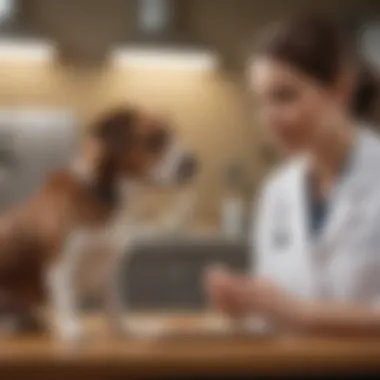Nutritional Solutions for Canine Diarrhea


Intro
Canine diarrhea is a distressing issue faced by many dog owners. It can arise from various reasons such as dietary indiscretion, infections, or underlying health problems. Recognizing the necessity of appropriate dietary interventions is crucial. With a balanced diet, many cases of diarrhea can be managed effectively. This guide aims to provide insights on what you can offer your dog during such times, highlighting safe foods and supplements. Additionally, the importance of consulting with veterinarians cannot be overstated. They are invaluable in diagnosing the underlying cause and suggesting tailored nutrition strategies.
Understanding Your Pet
Breed Traits
Different breeds exhibit unique traits that can impact their digestion and nutrition needs. For instance, breeds like the Labrador Retriever are known for their hearty appetites and can be prone to overindulgence, leading to digestive issues. In contrast, smaller breeds may have different dietary tolerances that need careful consideration. Understanding these traits is essential while addressing issues like diarrhea.
Common Temperaments
The temperament of your dog can influence how they handle stress, which, in return, might affect their gastrointestinal health. For example, anxious dogs may experience digestive problems under stress, leading to diarrhea episodes. Recognizing your dog's temperament will help in handling and reducing factors that could contribute to digestive upset.
Special Needs
Puppies, seniors, and dogs with existing health conditions may have specific nutritional requirements. Puppies often require a diet rich in calories and nutrients. Senior dogs may need easily digestible foods. Likewise, dogs with health issues like pancreatitis must follow a restricted diet designed to avoid exacerbating their conditions. Tailoring their diet according to these special needs is crucial for overall health.
Pet Care Essentials
Nutrition and Feeding Guidelines
When your dog experiences diarrhea, it's vital to adjust their diet cautiously. Start with bland, easily digestible foods. Options such as boiled chicken, white rice, and plain pumpkin can help soothe an upset stomach. Gradually reintroduce their regular food once the diarrhea subsides. Ensure they are hydrated, as diarrhea can lead to fluid loss, which is dangerous.
Grooming Tips and Techniques
Maintaining cleanliness is necessary, especially when a dog has diarrhea. Regularly groom your dog to ensure any mess is promptly managed. Use wipes formulated for pets to clean the rear area after bathroom breaks.
Health and Wellness
Routine veterinary check-ups can prevent health issues from escalating. Monitor your dog's overall health by observing their eating habits, weight changes, and energy levels. Early detection of potential problems can be pivotal in preventing conditions that lead to diarrhea.
Training and Behavior
Basic Training Techniques
Training your dog to have regular bathroom breaks can help minimize accidents in the home. Establish a consistent feeding schedule and take your dog out frequently. This routine can also alleviate anxiety that contributes to digestive upset.
Behavioral Problems and Solutions
If your dog shows signs of behavioral distress, it may lead to gastrointestinal issues. Address these behaviors with positive reinforcement and patience. Sometimes, working with a dog trainer can help resolve behaviors that lead to stress-induced diarrhea.
Mental Stimulation Activities
Keeping your dog mentally engaged can mitigate anxiety. Activities such as puzzle toys or new tricks keep their minds occupied and can lessen stress. A relaxed dog is less likely to experience digestive disruptions.
Engaging with Your Pet
Interactive Games and Toys
Invest in interactive toys that challenge your dog’s intellect. These toys help keep them engaged and alleviate boredom, reducing anxiety levels that may trigger digestive issues.
Safe Outdoor Activities
Regular exercise is essential for a dog’s overall health. Taking your dog for walks or playing fetch can help regulate their digestive system. However, avoid introducing new foods immediately after vigorous activities, as it can lead to stomach upset.
Family-Friendly Pet Interactions
Involve all family members in caring and interacting with your pet. Consistency in care routines and feeding can help the dog feel secure and reduce stress levels, which helps avoid digestive issues.
Pet Adoption and Integration
Choosing the Right Pet for Your Lifestyle


When considering a dog for adoption, assess the breed's typical health and dietary needs. Acknowledge if you can manage specific dietary requirements that might arise, particularly concerning gastrointestinal health.
Preparing Your Home for a New Pet
Ensure your home is ready to cater to a pet’s needs. This includes appropriate feeding areas, dog-proofing spaces, and being prepared to manage potential health issues like diarrhea.
Tips for Smooth Prolusion
If you already have pets, ensure any new arrival is introduced gradually. Mismanaged introductions can cause stress for your existing pets and lead to changes in behavior, including potential digestive upset.
Key Insight: Always consult a veterinarian when your dog has diarrhea lasting for more than a day. Prompt intervention can prevent more severe health problems.
Understanding Diarrhea in Dogs
Understanding the causes and nature of diarrhea in dogs is foundational for responsible pet ownership. Diarrhea can signal a range of health issues, from mild dietary indiscretions to serious infections. Recognizing these factors can help in making informed decisions about dietary adjustments that may alleviate symptoms and promote recovery.
Defining Diarrhea
Diarrhea is characterized by frequent, loose, or watery stools. This condition may occur episodically or persistently, impacting your dog's health and comfort. While it is a common issue, determining the underlying cause is crucial to effective treatment. More than simply a nuisance, diarrhea can lead to dehydration and nutrient loss, requiring careful management to ensure your dog's well-being.
Common Causes
Dietary Changes
A key contributor to canine diarrhea can be sudden dietary changes. When a dog’s diet alters rapidly, it may disrupt their digestive system. This could happen when introducing new foods or switching brands. The digestive system needs time to adjust, and sudden changes may cause gastrointestinal upset. Therefore, a gradual introduction of new foods is often a recommended approach. It offers the dog's intestines time to adapt and helps minimize distress.
Food Allergies
Food allergies are another significant cause of diarrhea in dogs. Some dogs may become intolerant to certain ingredients in their food, such as beef, chicken, or grains. The immune system mistakenly identifies these proteins as harmful, resulting in gastrointestinal reactions. Identifying and eliminating the trigger food can improve a dog's health significantly. This condition requires careful observation from the owner to ensure it does not lead to chronic digestive issues.
Infections
Infections are an additional serious cause of diarrhea, which can stem from bacteria, viruses, or parasites. Canine parvovirus, for example, presents severe symptoms beyond diarrhea, including vomiting and lethargy. Infections often necessitate immediate veterinary intervention to avoid severe health complications. Monitoring your dog's environment, diet, and social interactions will help reduce the risk of infectious agents.
Intestinal Parasites
Intestinal parasites like worms contribute significantly to diarrhea as well. These parasites inhabit the gastrointestinal tract, consuming nutrients and disrupting normal functions. Signs of infestation include not only diarrhea but also weight loss and a dull coat. Regular veterinary checkups and preventative medications are essential to control and prevent parasitic infections, safeguarding your dog's health.
Chronic Conditions
Chronic conditions such as inflammatory bowel disease or pancreatitis can lead to persistent diarrhea. These issues often need ongoing management and a long-term dietary plan. It is vital for pet owners to be alert to changes in their dog’s stool and overall health. Working with a veterinarian is crucial in diagnosing these conditions and determining an appropriate dietary response.
When to Consult a Veterinarian
If your dog's diarrhea persists for more than a day or is accompanied by other symptoms such as vomiting, lethargy, or fever, a veterinarian should be consulted. Early intervention can prevent more severe health issues and ensure your dog receives suitable treatment tailored to their condition. Observing the consistency and frequency of stools can provide vital clues for your veterinarian in diagnosing the underlying problem.
Immediate Dietary Adjustments
When a dog experiences diarrhea, immediate dietary adjustments are vital for effective recovery. Changing the dog's diet can help soothe the gastrointestinal tract, allowing it to heal while preventing further irritation. These adjustments focus on simple and easily digestible foods, which play an important role in managing the condition.
Fasting Periods
Duration and Guidelines
A fasting period is often the first step in addressing diarrhea in dogs. During this time, withholding food for 12 to 24 hours allows the digestive system to rest. This is especially beneficial if there have been frequent loose stools. Typically, small dogs may require a shorter fasting duration, while larger dogs can often handle longer. The main characteristic of this approach is simplicity—avoid complications by giving the gut time to recover.
However, pet owners must monitor their dog closely and ensure they do not develop noticeable weakness or lethargy. A fasting period facilitates healing but should be carefully timed; too long can lead to further issues, such as nutritional deficiencies.
Signs of Dehydration
During episodes of diarrhea, dogs are at risk for dehydration. It is essential to recognize signs of dehydration, which can include dry gums, excessive panting, and decreased skin elasticity. These indicators are crucial because hydration is necessary for any recovery process. When a dog is dehydrated, their internal functions can get significantly disrupted, which may complicate recovery from diarrhea.
Being aware of these signs allows pet owners to take corrective measures quickly. If dehydration is severe, veterinary assistance is necessary. In many cases, addressing hydration can mean the difference between a simple recovery and a complex health issue.
Bland Diet Recommendations


Boiled Chicken
After a fasting period, introducing a bland diet is often recommended. Boiled chicken serves as an excellent alternative. It is low in fat and easily digestible, which makes it a beneficial option during recovery. The key characteristic of boiled chicken is its simplicity, as it does not contain additional spices or oils that might irritate the stomach.
Boiled chicken provides essential protein without overwhelming an already sensitive digestive system. Its primary advantage lies in its palatability, encouraging dogs to eat when they may otherwise refuse food. However, it is important to ensure it is skinless and boneless to prevent any potential choking hazards.
White Rice
White rice is another staple in bland diet recommendations. It acts as a binder, helping firm up watery stools. The starch in white rice serves as a simple carbohydrate that is gentle on the stomach. Additionally, it is easy to prepare and mix with boiled chicken to form a nutritious yet bland meal. Thus, it becomes a valuable part of the recovery process.
A unique feature of white rice is its availability and affordability. Almost every household has it in stock, which allows for easy incorporation into a dog's diet without additional costs. However, pet owners should avoid over-relying on it, as it lacks essential nutrients required for long-term dog health.
Pumpkin
Pumpkin is often overlooked and serves as a beneficial addition to a bland diet. Pureed pumpkin contains soluble fiber, which can help regulate bowel movements—both in diarrhea and constipation. It is a rich source of vitamins and minerals, making it a nutritious option.
The appeal of pumpkin lies in its natural form; many dogs enjoy its taste, making it easier to get them to eat during recovery. However, it is important to choose plain canned pumpkin without added sugar or spices. Its disadvantage is that in some cases, dogs can be sensitive to it, so monitoring is critical.
Adjusting a dog’s diet during episodes of diarrhea is crucial. Always consult with a veterinarian for severe cases, implementing dietary changes carefully to ensure optimal recovery.
Hydration and Electrolyte Balance
Hydration and electrolyte balance are critical when managing canine diarrhea. Diarrhea can lead to significant fluid loss in dogs, causing dehydration and an imbalance of essential electrolytes. Ensuring proper hydration supports overall recovery and is necessary for maintaining normal bodily functions. This section details the importance of hydration and the various methods for rehydrating your dog during these distressing times.
Importance of Hydration
The significance of hydration cannot be overstated, especially during episodes of diarrhea. Dogs lose a considerable amount of water and electrolytes through their digestive system. This loss can result in symptoms such as weakness, lethargy, and, at times, serious health complications.
Regular water intake helps facilitate digestion and nutrient absorption. Moreover, hydration plays a role in the healthy functioning of the kidneys and other organs. If you observe watery stools, it is vital to maintain your dog's hydration levels as a first line of defense. Watch for indicators of dehydration, such as dry gums or skin elasticity. It is essential to offer fresh water consistently.
Oral Rehydration Solutions
When your dog experiences diarrhea, oral rehydration solutions can be effective for restoring lost fluids and electrolytes. There are two primary options: commercial solutions and homemade alternatives.
Commercial Solutions
Commercial rehydration solutions are readily available and formulated specifically for pets. They provide an easy way to administer electrolytes and glucose, helping to quickly restore hydration. The key characteristic of these solutions is their balanced formulation, ensuring dogs receive the right quantities of sodium, potassium, and glucose.
A unique feature of commercial products, like Vet’s Preferred Canine Electrolyte Powder, is their ease of use; they often come in concentrated powder forms to mix with water. One advantage of these solutions is consistency in formulation, which ensures a reliable source of nutrients. However, some products may be higher in sugar, which is not ideal for all dogs.
Homemade Alternatives
Homemade alternatives are another option for rehydrating your dog. Many pet owners prefer them as they allow for control over the ingredients. A simple homemade solution can be crafted using water, a small amount of salt, and sugar. This mix helps replace lost fluids and offers hydration without additives.
The unique feature of homemade alternatives lies in their customizability. Pet owners can modify the ratios to suit their dog's needs based on age, size, and health conditions. However, a drawback is that the homemade mixtures may not provide all the specific electrolytes required for a balanced diet, leading to potential nutritional gaps. Therefore, while homemade options can be beneficial, they should be used carefully and monitored closely.
Introducing Solids Back into the Diet
Once the initial phase of diarrhea has passed, it is crucial to approach the reintroduction of solid foods carefully. Properly reintroducing solids into a dog's diet can help restore digestion and prevent future gastrointestinal upset. This process also ensures that the dog receives necessary nutrients while minimizing the risk of further issues.
Gradual Reintroduction
The strategy for introducing solids should be gradual. A sudden return to a regular diet can overwhelm a dog's recovering digestive system. Begin with small portions of bland foods that are gentle on the stomach. Foods such as boiled chicken, plain white rice, or canned pumpkin are often recommended due to their low fat and low fiber content.
A sample plan might involve the following steps:
- Days 1 to 2: Offer small amounts of bland food, perhaps two to three times a day.
- Day 3: If there are no signs of recurrence in diarrhea, start mixing in a small portion of their regular food.
- Days 4 to 5: Continue to monitor and gradually increase the proportion of regular food mixed with bland food.
- After 5 Days: If there are no adverse reactions, switch back to the regular diet fully.
In this process, it is vital to keep portions small to avoid overloading the digestive tract. This allows the intestinal system to acclimate back to solid food gradually.
Monitoring for Reactions
As a dog transitions back to a normal diet, close monitoring is essential. Watch for any signs of digestive upset. Symptoms to observe include:
- Loose stools: A return of diarrhea after reintroducing solids warrants immediate attention.
- Vomiting: Ingestion of food while being unable to retain it can indicate distress.
- Lethargy: A decrease in energy or enthusiasm may hint at an unresolved issue.
- Abdominal discomfort: Signs such as bloating or excessive gas can signal that adjustments need to be made.


It is important to keep a log of what is fed and when reactions occur, as this history can be useful for veterinarians if problems persist.
If any of these symptoms appear, it may be necessary to revert to a bland diet and consult a veterinarian for further evaluation. In some cases, specific food allergies might also become evident, prompting the need for dietary adjustments in the future.
Being observant during this stage is key in ensuring a full recovery. An optimal approach combines careful monitoring with a gradual increase in normal feeding, supporting the dog’s health during recovery.
Probiotics and Their Role
Probiotics play a significant role in managing canine diarrhea. These beneficial bacteria help to restore the balance of gut flora, aiding digestion and improving intestinal health in dogs. When a dog suffers from diarrhea, the natural balance of these microorganisms can be disrupted. Probiotics can assist in re-establishing this balance, which can be crucial for recovery.
Benefits of Probiotics
Probiotics offer several advantages for dogs experiencing diarrhea:
- Restoration of Gut Flora: They help replace harmful bacteria with beneficial ones, promoting a healthier digestive environment.
- Reduction of Diarrhea Duration: Studies have shown that probiotics can significantly shorten the period of diarrhea.
- Support for Immune Function: Healthy gut flora contributes to improved immune responses, helping dogs fend off further infections.
Probiotics can help your dog bounce back faster from digestive issues by balancing their gut bacteria.
Types of Probiotics Available
Probiotics can be categorized into two main sources: Natural Sources and Commercial Supplements.
Natural Sources
Natural sources of probiotics include foods that inherently contain these beneficial bacteria. Examples are:
- Yogurt: Plain, unsweetened yogurt can be a good option but check the ingredients for artificial additives.
- Fermented Foods: These include products like kefir or sauerkraut, which provide a range of probiotics.
The key characteristic of natural sources is their ease of access and low cost. They offer a simple way to introduce probiotics to your dog's diet. However, it is important to ensure that the food does not contain any harmful additives or excessive sugars, as these can aggravate diarrhea.
Commercial Supplements
Commercial supplements are designed specifically for pets. These probiotics often come in powder, capsule, or chewable forms. They provide a reliable concentration of beneficial bacteria. Key characteristics include:
- Formulated for Dogs: Many products are tailored specifically for canine digestive systems.
- Guaranteed Potency: Unlike some natural sources, these products often guarantee the number of live cultures up to the expiration date.
Commercial supplements can be a beneficial choice for those needing a more controlled and powerful probiotic solution. However, the cost can be higher than natural sources. Additionally, some dogs may be sensitive to certain fillers or ingredients used in supplements, so always read labels carefully and consult with your veterinarian.
Nutritional Supplements
Nutritional supplements play a crucial role in the recovery process for dogs experiencing diarrhea. Proper nutrition can help restore gut health, improve digestion, and provide essential nutrients that may have been lost during illness. These supplements can support the body in its healing journey and help maintain overall wellness. It is essential for pet owners to understand what supplements are effective, their benefits, and how to incorporate them into their dog’s diet.
Pumpkin and Its Benefits
Pumpkin is a highly recommended supplement for dogs with diarrhea. It is rich in soluble fiber, which can help absorb excess water in the digestive tract. The soluble fiber aids in forming firmer stools, which is beneficial when a dog is experiencing loose stools. Furthermore, pumpkin contains vitamins and minerals such as Vitamin A, potassium, and iron, which support overall health.
When introducing pumpkin to your dog's diet, it's important to use plain canned pumpkin without added sugars or spices. Avoid using pumpkin pie filling as it may contain harmful ingredients. You can start by adding one to two tablespoons of pumpkin to your dog's food, depending on their size. Monitor their response, adjusting the amount as necessary. Its high water content also helps maintain hydration, which is critical during episodes of diarrhea.
Bone Broth as a Nutrient Source
Bone broth is another beneficial supplement when addressing canine diarrhea. It is a nutrient-dense liquid made from simmering bones and connective tissues, releasing essential nutrients like collagen, amino acids, and minerals. Bone broth is gentle on the stomach and can provide easily digestible nutrients. This can be especially helpful for dogs recovering from gastrointestinal issues.
To make bone broth, simmer high-quality bones, such as beef or poultry, in water for an extended period. Some recipes suggest adding vegetables like carrots and celery for additional nutrients. After cooking, strain the broth and remove any solids. Allow it to cool, and then serve it as a flavorful liquid mixed with your dog's regular food or on its own. Keep in mind to use low-sodium versions to avoid excessive salt intake.
Bone broth not only provides hydration but also strengthens the gut lining and boosts overall health in dogs, making it a great addition to their diet during recovery.
Both pumpkin and bone broth serve as excellent nutritional supplements. They can be easily integrated into your dog's recovery diet, offering support during a challenging time. Always consult with your veterinarian before introducing new supplements, especially if your dog has underlying health conditions.
Culmination
Understanding what to feed a dog with diarrhea is critical for effective management of this common issue. Nutritional solutions play a significant role in ensuring recovery, as the right diet can help restore gut health and prevent further complications. By exploring the various dietary recommendations provided in this article, pet owners are better equipped to make informed decisions regarding their dog’s nutrition during these challenging times.
Recap of Key Points
- Understanding Dog Diarrhea: Grasping the causes of diarrhea is essential. From dietary changes to infections, recognizing these factors can aid in choosing the right food.
- Immediate Dietary Adjustments: Implementing a fasting period followed by a bland diet can simplify digestive rest.
- Hydration is Crucial: Keeping your dog hydrated is non-negotiable. Proper hydration supports overall health and recovery.
- Probiotics: These supplements are beneficial in restoring normal gut flora, aiding digestion effectively.
- Nutritional Supplements: Foods like pumpkin and bone broth can provide vital nutrients and soothe the digestive tract.
Final Recommendations
When managing canine diarrhea, always prioritize a gradual diet reintroduction. Monitor your dog closely for any signs of discomfort or adverse reactions. Moreover, incorporating probiotics and nutritional supplements can enhance recovery. Consult a veterinarian if diarrhea persists beyond a couple of days or is accompanied by severe symptoms.
The nuances of canine nutrition during illness underline the importance of a tailored approach. By employing the strategies discussed, you can support your dog’s health holistically, ensuring a return to normalcy without unnecessary stress.



